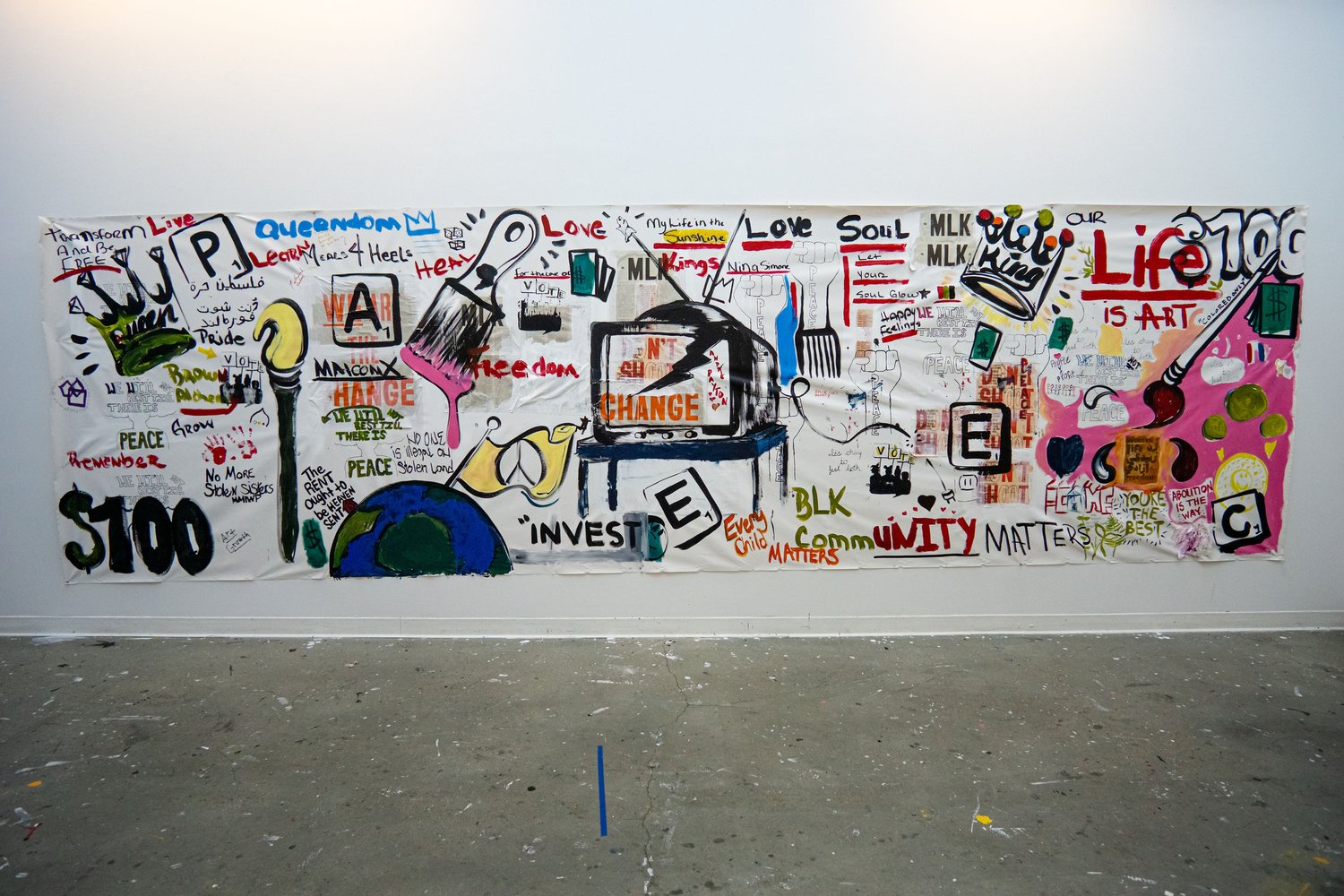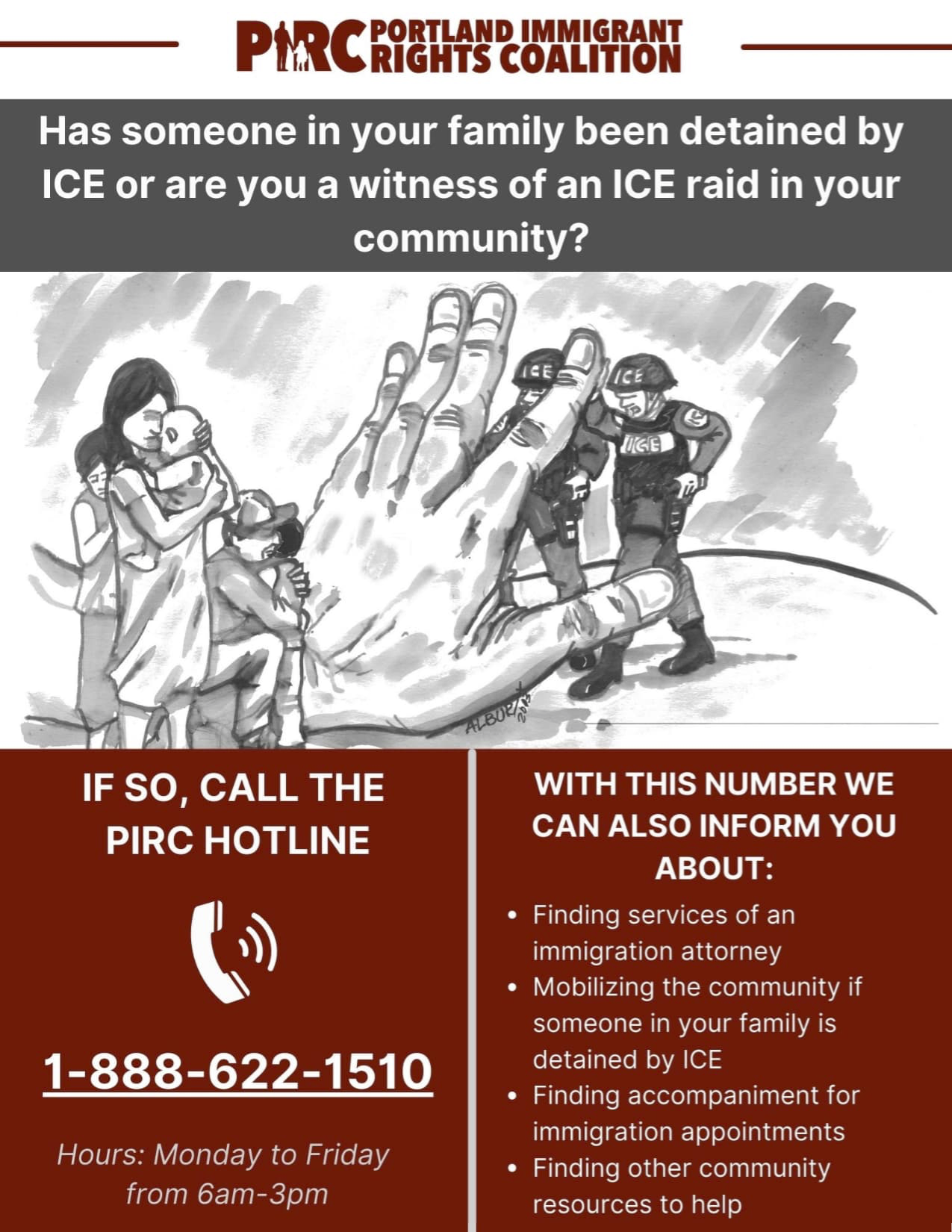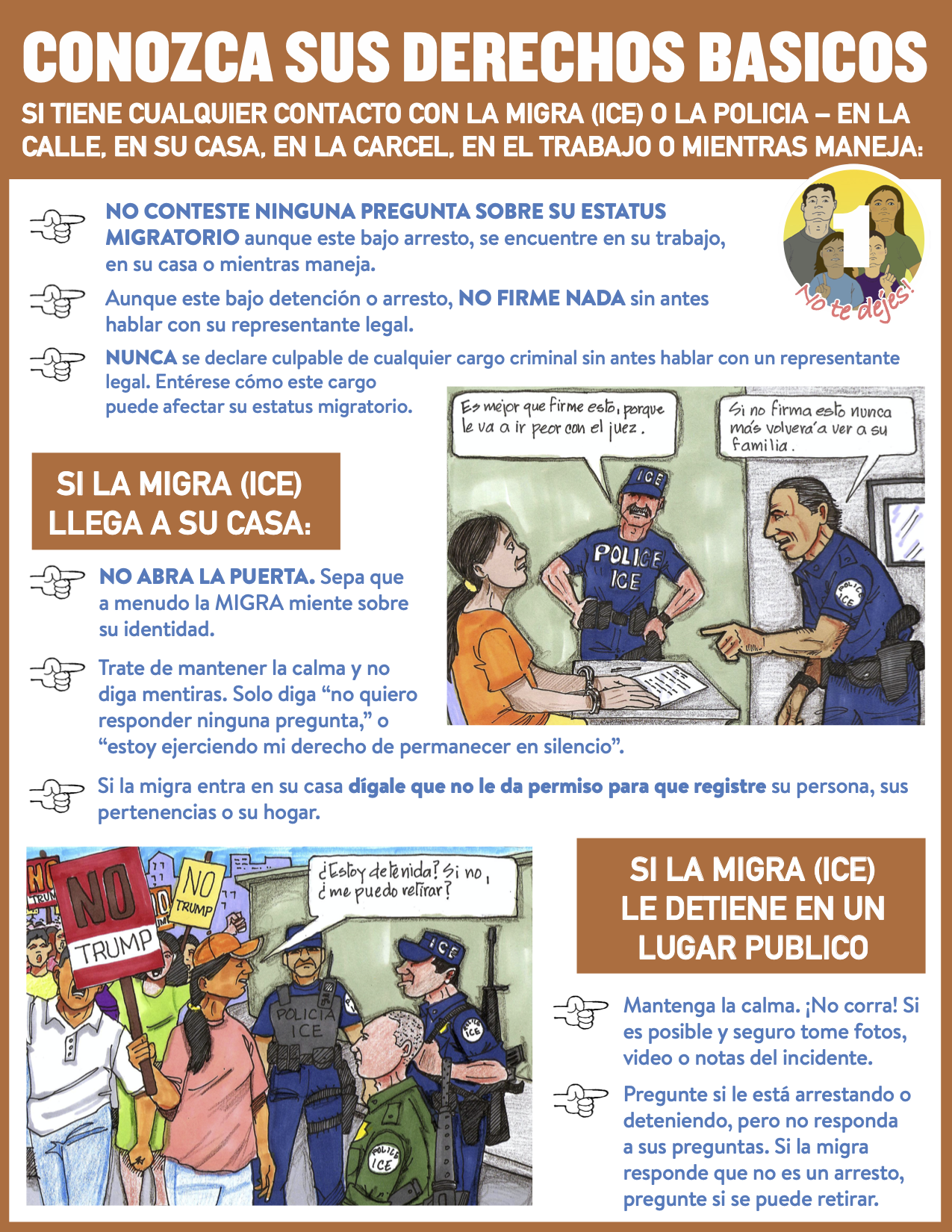What to do after a loved one is taken by ice [know your rights info guide]
There are many resources already circulating that explain how to refuse allowing ICE to enter your home or vehicle, but few explain what may happen after a loved one is taken by ICE.
In creating the language for this document alongside a community member who has experienced the process of detainment, transfer, detention with intent to deport, the ensuing legal process, and eventual release with conditions and continued legal process, they wanted to state that the clear intention of this document is NOT to create additional stress, fear, or anxiety, but to provide clarity and practical understanding of the experience that people may or may not have to face.
If you or someone you know is in need of pro bono immigration legal services, please email us at contact@dontshootpdx.org and we will connect you with our network of attorneys.
If a person is picked up by ICE in the Portland area, they will likely be brought to the ICE Field Office Location: 4310 S Macadam Avenue Suite 300 Portland, OR 97239 United States (503) 326-4165. This Field Office is currently permitted by the city of Portland, Oregon, which does not have its own ICE detention center, and instead relies on this field office on Macadam to serve as a holding and transport facility.
From the Voice of a Survivor:
A person taken by ICE in the Portland area will be brought to this center. Due to short staffing it does not operate very well during the weekends. This facility also holds civilians accused of criminal offenses, so expect to be in a holding cell with repeat offenders of all non-immigration crimes either next door or if overcrowding is prevalent in your own holding cell. This facility has low temps running all the time to aid the ICE officers running around, so expect a cold night on concrete slab benches with one open-air toilet that has not been sanitized; that is: expect blood and fecal matter everywhere in the cell. As soon as staffing is available, a search of all immigration related aliens will be conducted: If by this point you have stuffed toilet paper in your clothes to stay warm during the night and need to let the ICE officers know before transport, this is the time to do it; otherwise you may be transported to the detention center with a additional charge which may or may not increase your civil charge from a misdemeanor to a felony (which may qualify for time served in the US before deportation). Make sure that you make the transporting officers know of what you may or may not have on you before boarding the deportation bus. However, once you have arrived at the detention center expect to be searched and asked to remove your clothes and put on government-issued clothes. Soon after, expect to be placed in another holding cell (this time); only in an immigrant detainee holding cell along with a random mix of low level to high level immigrant detainees; this is the moment you may be in the same room as young/old, cartel/gang members from across the world. Do not speak to anyone at this point which will give you 50 points to skip solitary and go straight to your new bunk bed and bunk mate. After an undetermined amount of time, all belongings will be signed off by you, and you will be issued an alien ID card. Do not lose your alien ID card because it will be your new knife/fork/spoon as well as your access pass to brush your teeth, get a haircut, cut your fingernails, go to church, shave, and take a meal.
Northwest Ice Processing Center
1623 E J Street, Suite 2
Tacoma, WA 98421-1615
Once a person has arrived at the detention center, they will be placed in a cell with about 30 other detainees. The majority of the detainees are Spanish-speakers from Mexico or Central America, but there are also detainees from many other nations.
There is a noted absence of legal resources in Spanish. They are not attempting to make the documents available in Spanish. Legal documents will likely only be available in English. The person helping to author and edit this document, who was detained for more than a month after a traffic stop, is bilingual. They were therefore constantly occupied with providing translation to fellow detainees who could not read the legal documents being presented to them and deeply needed support.
Crucial information to know:
Sleeping: Detainees share bunk beds in cold, crowded cinderblock rooms. Once a person gets their bunk bed, prior to which they are sleeping on a cold, concrete slab, they are in a room with heat. After they strip search you and make you change clothes, you will be assigned a bunk in a room with thirty other people of the same gender (which they call a pod). Once you get out of the holding cells, it is no longer as cold. Every piece of clothing available is needed for warmth in the holding cells.
Eating: Detainees are provided three meals per day. It is worse than anything you can imagine. Food is undercooked and often visibly dirty. Detainees have no eating utensils and have to cut food with their ID card or break it apart with their hands. Many detainees become dehydrated because the more you drink, the more you have to communicate with oppressive guards to gain permission to go to the bathroom.
Bathrooms: Bathrooms are also not private, so there are dangers just going to the bathroom. Detainees have to get permission and cannot go the bathroom at any time. They also do not allow detainees to brush their teeth and often micromanage people with regard to basic human rights.
Vending machines are available on a credit/debt system. Cards must be loaded with funds by people outside the facility, but the actual food available in the vending machine is extremely expensive and non-satisfying. For example, Fritos may be $5. This system can increase a family’s debt or financial hardship with little added benefit for their loved one.
Visiting: The center is open for visiting seven days per week. A maximum of two adults and two children may visit at one time. All adults must present ID, which can be terrifying for family members who are also undocumented.
The visit will likely take place in what looks like a hallway with a window between visitors on one side and imprisoned people on the other side.
Calls: Detainees cannot receive calls. They may only receive urgent messages transmitted by calling (253) 396-1611 and leave the detainee's full name, alien registration number and your name and telephone number where you can be reached. The detainee will be given your message. People who are detained may also use the postal system, but must pay for postage.
Legal: A person detained by ICE will need access to an attorney. Below (or linked) are two forms that may be helpful for people to have access to ahead of time:
Forms that could be helpful and will be needed are linked here:
https://www.uscis.gov/g-28 - The first form is basically a statement that you have an attorney to represent you and now you will be required to wait.
https://www.ice.gov/doclib/forms/i246.pdf - The second form is your application for your removal or deportation to be cancelled.
They will go through a process in immigration court. After that, there will be a bond hearing, but if you don’t post bond, you could be there for up to three years. There is sometimes a chance to post bond; however, many people experience having to weigh the costs of using all available funds to post bond and get out versus staying in and saving any available funds to pay attorneys for costly legal processes. Do not expect an opportunity to make your declaration to cancel your pending removal if you do not have a pathway to deportation immunity (work/student visa/green card); ICE is not considering granting asylum on account of escaping of criminal violence (gang/cartel/organized crime). The case to case immigration appeal will most likely occur after an out of pocket immigration attorney is hired to represent you. Local Portland legal resources here:
PCC Clear Clinic
Portland Immigrant Rights Coalition
National Day Laborer Organizing Network (NDLON)
************************
Spanish Translation:
Ya existen muchas gráficas que explican cómo negarse a permitir que ICE entre en su hogar o vehículo, pero pocos explican lo que puede suceder después de que un ser querido sea detenido por ICE.
Cuando se creó el lenguaje de este documento con una persona que realmente experimentó todo el proceso de detención, traslado a Tacoma y detención con la intención de deportación, el proceso legal posterior y la eventual liberación con condiciones y proceso legal continuo, se quiso dejar claro que la intención de este documento no es crear estrés, miedo o ansiedad adicionales, sino proporcionar claridad y comprensión práctica de la experiencia que las personas pueden o no tener que enfrentar.
Si una persona es detenida por ICE en el área de Portland, probablemente será llevada al Centro de Detención de ICE: 4310 S Macadam Avenue Suite 300 Portland, OR 97239 Estados Unidos (503) 326-4165. Este centro opera con un permiso a través de la ciudad de Portland, Oregon. ICE no tiene su propio centro de detención y, en su lugar, depende de esta oficina en Macadam para servir como instalación de retención y transporte.
Desde la Voz de un Sobreviviente:
Una persona detenida por ICE en el área de Portland será llevada a este centro. Debido a la escasez de personal, no funciona muy bien durante los fines de semana. Esta instalación también alberga a personas civiles acusadas de crímenes, por lo que se puede esperar estar en una celda de retención con delincuentes reincidentes de todos los delitos no relacionados con inmigración, ya sea en la celda de al lado o, si hay hacinamiento, en la misma celda. Esta instalación tiene temperaturas bajas constantemente para ayudar a los oficiales de ICE que corren de un lado a otro, así que prepárate para una noche fría sobre bancos de cemento con un baño de aire libre que no ha sido desinfectado; es decir, prepárate para ver sangre y material fecal por todo el suelo de la celda. Tan pronto como haya personal disponible, se realizará un registro de todos los detenidos relacionados con inmigración: Si en este momento has metido papel higiénico en tu ropa para mantenerte abrigado durante la noche y necesitas informar a los oficiales de ICE antes del traslado, este es el momento de hacerlo; de lo contrario, podrías ser trasladado al centro de detención con un cargo adicional que puede o no aumentar tu cargo civil de delito menor a delito grave (lo que podría calificar para tiempo cumplido en los EE. UU. antes de la deportación). Asegúrate de que los oficiales de transporte sepan lo que puedes o no llevar contigo antes de abordar el autobús de traslación. Sin embargo, una vez que llegues al centro de detención en Tacoma, prepárate para ser registrado y que te pidan que te quites la ropa y te pongas ropa provista por el gobierno. Poco después, se espera que seas colocado en otra celda de retención (esta vez); solo en una celda de inmigrantes detenidos junto con una mezcla aleatoria de detenidos de bajo a alto nivel; es decir, este es el momento en que puedes estar en la misma habitación que jóvenes/viejos, miembros de carteles/bandas de todo el mundo. Después de un tiempo indeterminado, todas tus pertenencias serán firmadas por ti, y se te entregará una tarjeta de identificación de extranjero. No pierdas tu tarjeta de identificación de extranjero porque será tu cuchillo y tenedor/cucharita, así como tu pase para cepillarte los dientes, cortarte el cabello, cortarte las uñas, ir a la iglesia, afeitarte y tomar una comida.
Northwest Ice Processing Center Seattle Field Office 1623 E J Street, Suite 2 Tacoma, WA 98421-1615
Una vez que una persona llegue al centro de detención, será colocada en una celda con unas 30 personas más. La mayoría de los detenidos son hispanohablantes de México o América Central, pero también hay detenidos de muchas otras naciones.
Los documentos legales probablemente solo estarán disponibles en inglés. La persona que ayudó a redactar y editar este documento, quien estuvo detenida por más de un mes tras una parada de tráfico, es bilingüe. Por lo tanto, estuvo constantemente ocupada proporcionando traducción a otros detenidos que no podían leer los documentos legales que se les presentaban y que necesitaban apoyo.
Información crucial que debe saber: Condiciones: Dormir: Los detenidos comparten literas en habitaciones frías y abarrotadas de bloques de cemento. Una vez que una persona obtiene su litera, antes de eso duerme sobre una losa de concreto. Después de que te registren y te hagan cambiarte de ropa, se te asignará una litera en una habitación con otras treinta personas del mismo género (lo que llaman un “pod”). Una vez que salgas de las celdas de retención, ya no hace tanto frío. Toda pieza de ropa disponible es necesaria para abrigarse. Comer: Se les proporcionan tres comidas al día. Es peor de lo que puedes imaginar. La comida está poco cocida y a menudo visiblemente sucia. Los detenidos no tienen utensilios para comer y deben cortar la comida con su tarjeta de identificación o romperla con las manos. Muchos detenidos se deshidratan porque cuanto más beben, más tienen que comunicarse con los guardias opresivos para obtener permiso para ir al baño. Baños: Los baños tampoco son privados, por lo que existen peligros solo al ir al baño. Los detenidos deben pedir permiso y no pueden ir al baño en cualquier momento. Tampoco permiten que los detenidos se cepillen los dientes y a menudo microgestionan a las personas con respecto a los derechos humanos básicos.
Las máquinas expendedoras están disponibles con un sistema de crédito/deuda. Las tarjetas deben ser cargadas con fondos por personas fuera de la instalación, pero la comida disponible en la máquina expendedora es extremadamente cara y poco satisfactoria. Por ejemplo, los Fritos pueden costar $5. Este sistema puede aumentar la deuda o las dificultades financieras de una familia con poco beneficio adicional para su ser querido.
Visitas: El centro está abierto para visitas siete días a la semana. Un máximo de dos adultos y dos niños pueden visitar al mismo tiempo. Todos los adultos deben presentar una identificación, lo que puede ser aterrador para los miembros de la familia que también son indocumentados. La visita probablemente tendrá lugar en lo que parece un pasillo con una pared de ventana en el medio, con los visitantes de un lado y los prisioneros del otro lado.
Llamadas: Los detenidos no pueden recibir llamadas. Solo pueden recibir mensajes urgentes transmitidos llamando al (253) 396-1611 y dejando el nombre completo del detenido, el número de registro de extranjero y su nombre y número de teléfono donde se le puede contactar. Se le entregará el mensaje al detenido. Las personas detenidas también pueden utilizar el sistema postal, pero deben pagar el franqueo.
Legal: Una persona detenida por ICE necesitará acceso a un abogado. A continuación (o enlazado) se encuentran dos formularios que pueden ser útiles para que las personas tengan acceso a ellos con antelación:
Formularios a enviar aquí para enlazar: https://www.uscis.gov/g-28 - El primer formulario es básicamente una declaración de que tiene un abogado para representarlo y que ahora deberá esperar. https://www.ice.gov/doclib/forms/i246.pdf - El segundo formulario es su solicitud para cancelar su remoción o deportación.
Pasarán por un proceso en la corte de inmigración. Después de eso, habrá una audiencia de fianza, pero si no paga la fianza, podría estar allí hasta tres años. A veces hay una oportunidad de pagar la fianza; sin embargo, muchas personas experimentan tener que sopesar los costos de fondos disponibles para pagar la fianza y salir, versus quedarse adentro y ahorrar fondos para pagar abogados por procesos legales costosos. No espere una oportunidad para hacer su declaración para cancelar su remoción pendiente si no tiene un camino hacia la inmunidad de deportación (visa de trabajo/estudiante/tarjeta verde); ICE no está considerando conceder asilo por escapar de la violencia criminal (pandillas/carteles/crimen organizado). El recurso de apelación de inmigración caso por caso probablemente ocurrirá después de que se contrate a un abogado de inmigración particular para representarlo. Recursos legales locales de Portland aquí:
PCC Clear Clinic
Portland Immigrant Rights Coalition
National Day Laborer Organizing Network (NDLON)




